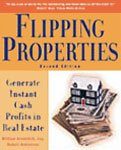How Much Should You Keep in
Rental Reserves?
by Attorney William Bronchick
“Cash is King”, so they say, and investor would be wise to keep an adequate cash reserve for things that can go wrong in real estate, particularly rentals. It is easy to buy real estate with no money down, but it’s difficult to survive when you have no cash set aside for a rainy day.
There’s no magic formula you can use to determine how much you should keep in reserve in the real estate business. When I have rental properties, the four key factors I consider are strength of the local rental market, eviction time line and cost, the age of the property, and the type of neighborhood.
Strength of the Local Rental Market
The lower the vacancy rates in your area, the fewer reserves you’ll need for vacancies. Your local newspaper or your city’s housing department may have articles or statistics on vacancy rates. You should, at a minimum, have enough cash reserves to pay for one month of vacancy per unit, which is only an 8-percent vacancy rate.
Even in a good market, you’ll deal with problem tenants who may stop paying rent and require an eviction. Good tenant screening will help solve this problem. If you plan to rent properties, you should always,without exception, do a rigorous background check on tenants. This includes reviewing credit reports, employment verification, references, and calling current and previous landlords.
Eviction Time Line and Cost
The length of time it takes to evict a tenant is relative to your cash reserves. In pro-tenant states like New York and Massachusetts, it could take months and thousands of dollars in legal fees to evict a tenant—all while you’re paying the mortgage. In addition, in our experience, collecting back rents or damages from tenants who’ve been evicted can be futile.
Age of the Property
With newer and recently renovated properties, you won’t need to anticipate many repairs in the first few years. As noted earlier, we recommend that you always hire a professional property inspector before you buy. Inspectors will go through the property with a fine-tooth comb, which helps ensure you’ll have no surprises later on. Another thing to keep in mind is that many utility companies offer a fixed monthly payment option so you don’t experience payment swings each season if you’re paying for heating, water, or other utilities as the landlord.
Type of Neighborhood
If you’re renting properties in low-income neighborhoods, you can expect the turnover to be much higher than in high-income areas. In addition, multiunit buildings with small units and one-bedroom condos will attract more single people who tend to move more often than families.
Cash flow management is the bedrock of survival in any business, with real estate being no exception. Investors must be careful not to run out of cash or they will be soon out of business.
Related Products
 |
 |
 |
| The Ultimate Guide to Owner Financing |
Flipping Properties | The Ultimate Guide to Wholesaling Houses |
